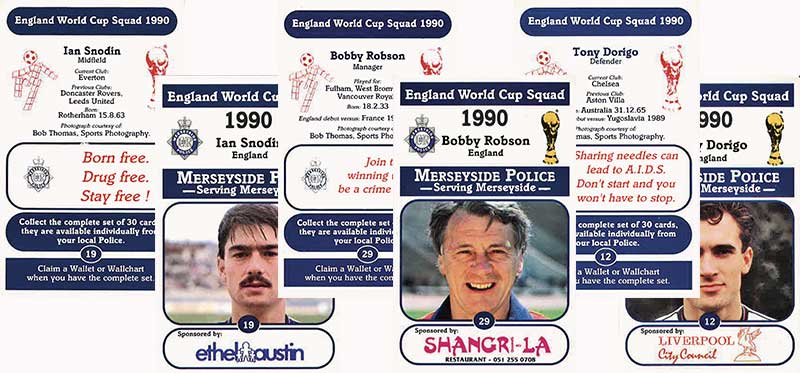
For some reason police forces once thought the lure of collecting cards depicting Ian Snodin in an England shirt would stop people committing crime
5 July ~ When my father-in-law took me aside at a recent family gathering I assumed he wanted to get my thoughts on Brexit, or at the very least ask when I was going to get a proper haircut. Instead he handed me a small green wallet embossed with a large gold Merseyside Police badge and the words “England World Cup Squad Italia 1990”. “Thought you might like these,” he said.
Inside, housed in individual plastic sleeves, were 30 cards featuring the players named in England’s provisional squad for that summer’s tournament. As a retired police inspector he explained that all uniformed officers on Merseyside were issued with these cards in the months leading up to the World Cup. The idea was that kids would approach them to “cop-a-card”, building trust between police and the local community.
The reverse of each card contains a potted player biography and a hard-hitting slogan consisting of a bafflingly impenetrable pun linking crime and football: “Don’t play for the other team – never go with a stranger.” Most swing wildly between the two hot topics of early 1990s crime prevention: hard drugs and cycle safety. Each card also features a sponsor and it’s an interesting reminder that commercial partners haven’t always been segregated in “tiers” depending on how much money they stump up. So while John Barnes is supported by Barclays, Bobby Robson is brought to you in association with Liverpool’s Shangri-La Chinese restaurant.
As this was Robson’s earliest squad (named in January and eventually cut from 30 to 26 and then the final 22) there are a number of nearly men who failed to make the plane at all. For football memorabilia completists these are almost certainly the only cards in existence featuring Paul Lake, Mike Newell and Ian Snodin in England shirts. The trio finished their careers without a single senior cap between them.
I was unfamiliar with “cop cards” but they’ve actually been around in the UK since 1982, with over 150 different sets released by various forces. The idea originated in the US and was introduced to Britain by a superintendent from South Wales following an exchange trip to the States. That first set featured Welsh rugby players and although football has been a popular subject it certainly hasn’t had a monopoly.
Postage stamps were also a regular favourite, alongside local history and police vehicles. However, not all forces participated as enthusiastically as others, which led to something of a postcode lottery for young collectors. Being born in West Yorkshire was the golden ticket for serious cop card enthusiasts, with the force releasing over 40 different sporting sets between 1986 and 2010 showcasing the stars of rugby league, football and even speedway. But spare a thought for the children of Oxford and Reading. In 1987, Thames Valley Police released their first and only set: 36 cards celebrating the region’s pay phones.
As well as international football the domestic game was also covered, although the club sides featured aren’t necessarily the ones you might expect. So while Celtic, Arsenal and Manchester United have yet to trouble the trouser pockets of the nation’s bobbies, Raith Rovers, Stevenage and Grimsby have all been immortalised in card. In fact, the plastic-coated Swindon Town set released in 1997 (featuring a young Sol Davis looking like he’s just been charged with robbing a local sub-post office) is spoken of in cop card circles with the hushed reverence usually reserved for illuminated manuscripts.
The cards seem to have been popular with kids and the police alike – I’m told competition between Merseyside officers to complete the Italia 90 set was particularly fierce – but the UK can’t quite match the US in terms of concrete crime-fighting results. In California in the mid-1980s the younger brother of a wanted criminal turned him in for half a dozen baseball cards featuring the popular Los Angeles Dodgers first baseman Steve Garvey.
There’s no record of kids in Birkenhead selling out relatives in return for a fistful of Tony Dorigos but perhaps the time is right for a modern reboot. Given the popularity of Pokemon Go, police forces could run a similar scheme ahead of next summer’s World Cup. Instead of swapping cards, kids could compete to be the first to discover a virtual reality Jamie Vardy skulking around the bins behind their local casino. And there can be few better warnings to stay on the straight and narrow than that. Tom Lines
This article first appeared in WSC 365, July 2017. Subscribers get free access to the complete WSC digital archive – you can find out more details here